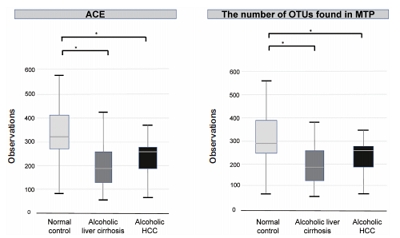Search
- Page Path
- HOME > Search
Original Article
- Gut-microbiome Taxonomic Profiling as Non-invasive Biomarkers for the Early Detection of Alcoholic Hepatocellular Carcinoma
- Jun Seok, Ki Tae Suk
- J Liver Cancer. 2020;20(1):32-40. Published online March 31, 2020
- DOI: https://doi.org/10.17998/jlc.20.1.32

- 5,473 Views
- 235 Downloads
-
 Abstract
Abstract
 PDF
PDF - Background/Aims
Hepatocellular carcinoma (HCC) is a prevalent form of primary liver cancer and the fifth leading cause of worldwide cancer mortality. Though early diagnosis of HCC is important, so far lack of effective biomarkers for early diagnosis of HCC has been a problem. In this study, we searched for potential functional biomarkers of alcoholic HCC by using metagenomics approach.
Methods
Between September 2017 and April 2019, normal control (n=44), alcoholic liver cirrhosis (n=44), and alcoholic HCC (n=13) groups were prospectively enrolled and analyzed. Gut microbiota was analyzed using the 16S-based microbiome taxonomic profiling platform of EzBioCloud Apps and analyzing system.
Results
There was a statistically significant difference among groups in diversity (P<0.05). In the comparison of phylum between cirrhosis and HCC, Proteobacteria were increased and Bacteroidetes were decreased. Firmicutes were not significantly different among the three groups. In the taxonomic profiling, relative abundance of Lactobacillus in the cirrhosis and HCC groups showed richness (P<0.05). In the biomarker analysis between cirrhosis and HCC, obiquinome Fe-S protein 3, global nitrogen regulator, Vesicle-associated membrane protein 7, toxin YoeB, peroxisome-assembly ATPase, and nitrogen oxide reductase regulator were differently expressed (P<0.001).
Conclusions
Alcoholic HCC showed different expressions in the stool taxonomy and biomarker compared with that of cirrhosis and control. Therefore, new biomarkers using stool analysis for alcoholic HCC are necessary.

Case Report
- A Case of Surgical Resection in Hepatocellular Carcinoma with Pulmonary Metastasis
- Woo Jin Jung, Jae Young Jang, Jun Seok Park, Hee Jeong Lee, Young Kyu Cho, Soung Won Jeong, Sae Hwan Lee, Snag Gyune Kim, Sang Woo Cha, Young Seok Kim, Young Deok Cho, Hong Soo Kim, Boo Sung Kim
- J Liver Cancer. 2016;16(2):145-150. Published online September 30, 2016
- DOI: https://doi.org/10.17998/jlc.16.2.145
- 1,132 Views
- 10 Downloads
-
 Abstract
Abstract
 PDF
PDF - Hepatocellular carcinoma (HCC) is well known malignancy with poor prognosis, even after resection of the primary tumor. Sorafenib is the first-line treatment in advanced HCC, but the disease control rate of sorafenib is only 43%. Pulmonary metastasectomy in patients with pulmonary metastasis from HCC has been reported to increase long-term survival compared with systemic chemotherapy. Video-assisted thoracic surgery is considered a reliable approach to the diagnosis and treatment of pulmonary diseases with low complication rate. Pulmonary metastasectomy is not universally accepted because of frequent local recurrence, an uncontrollable primary tumor, and frequent multiple pulmonary metastases in HCC, but outcome of pulmonary metastasectomy and adjuvant sorafenib therapy has not been studied. We experienced a patient who had advanced HCC with pulmonary oligometastasis and received surgical resection of the metastatic pulmonary nodule and sorafenib chemotherapy. In advanced HCC with pulmonary oligometastasis, surgical resection of pulmonary metastasis and sorafenib chemotherapy should be considered.


 E-submission
E-submission THE KOREAN LIVER CANCER ASSOCIATION
THE KOREAN LIVER CANCER ASSOCIATION
 First
First Prev
Prev



 Follow JLC on Twitter
Follow JLC on Twitter